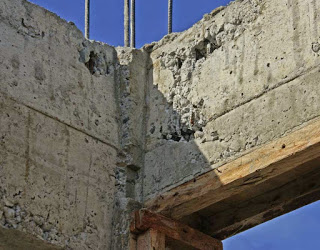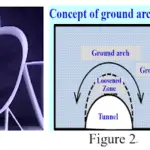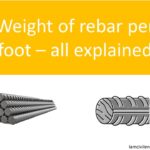Hollow spaces and cavities left in concrete mass on surface or inside the concrete mass where concrete could not reach are honeycombs, looking like honey bees nest.
Honeycombing in concrete, causes and remedies
The finishing in concrete works is vital as for sure the final touches depend on it. The poor finish of concrete is not only wrong from aesthetic point of view but also it shows the strength and integrity of the concrete structure. Besides many defects in concrete one important is honeycombing.
These honeycombs are visible to naked eyes and can be seen after the shuttering formwork is removed. Honey combs which are inside mass of concrete can only be detected by advanced techniques like ultrasonic testing etc.
Honeycomb is due to non-reaching of concrete to all places due to which cavities and hallow pockets are created.
Honeycombing is used to describe areas of the surface that are coarse and stony. It may be caused due to following :-
1. insufficient fine material in the mix,
2. incorrect aggregate grading
3. poor mixing or improper vibration
4. leakage of grout or mortar fraction from the concrete at construction or formwork joints
This can be corrected by increasing the sand and cement content of the mix and by proper mixing, placing and compaction. The obvious solution here is to ensure that joints are well sealed and leak-free.
Small, shallow areas of honeycombing are probably mainly cosmetic. However, deeper areas will lead to a local reduction in the protection to the reinforcement from the concrete cover and hence possibly durability problems in the future.
The honey combing developed in the concrete/ bottom of the diaphragms may be corrected as under :-
1. Remove the laitance and clean.
2. Wash the surface with clean water.
3. Remove free water.
4. Prepare approved bonding agent (Sika dur 32) as recommended by the manufacture / approved by the Engineers.
5. Prepare the concrete mix confirming the approved design.
6. Fill the honey combing area
7. Trowel with force
8. Finish smoothly with float.
9. Next Morning cure with water and clean.
10. Continue curing as desired.
11. The site Engineer, Foreman and workers have been strictly instructed to follow the specification and fully understand the scope of work.
12. Foreman must remain at site while the work goes on.

















